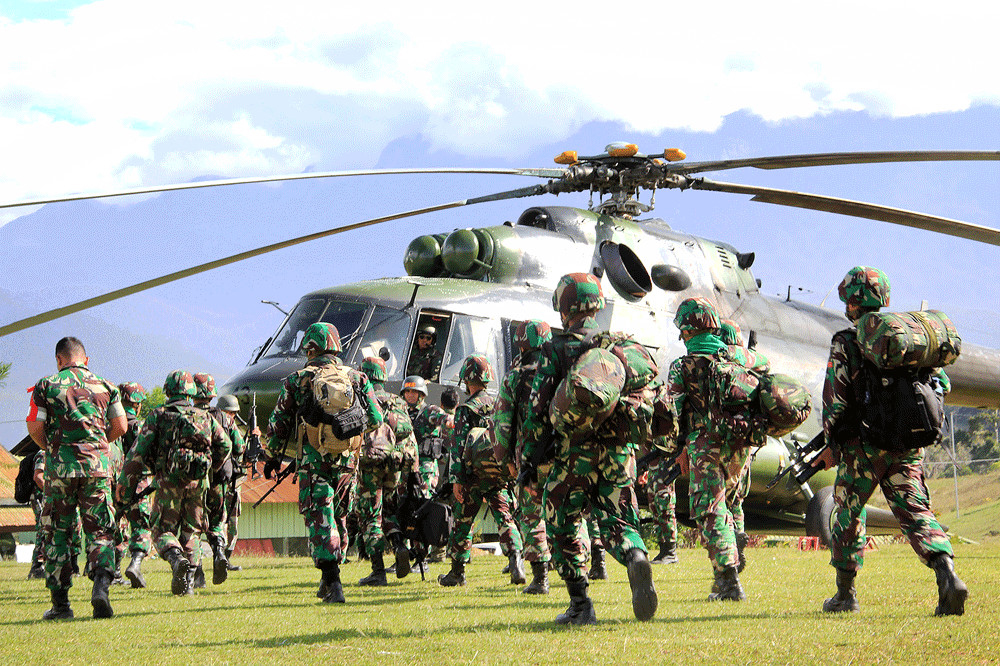
By Ivany Atina Arbi and Victor Mambor
JAKARTA/JAYAPURA (Jakarta Post/Pacific Media Watch): The latest death of a police brigadier in Puncak regency, Papua - blamed on Papuan armed rebels - has prompted Indonesian Vice-President Jusuf Kalla to suggest a “counterattack” against the armed group, while a civil society team verifying the victims in Nduga claimed they had confirmed the death of 182 people in the regency, mostly women and children.
On Tuesday at the presidential palace, Kalla said the counterattack should not be considered a “human rights violation”.
“This won’t be a human rights violation, because we have to see who violated human rights first. Sometimes people, especially [those in] foreign countries, consider all of these to be human rights violations,” Kalla said yesterday.
“What if the dead ones were from the Indonesian Military (TNI) and the National Police.”
The police reported that they had found the body of First Brigadier Hedar on Monday. He was shot in the back of the head, the police claimed.
Earlier, Hedar’s friend, Brigadier Alfonso said a group of men had abducted Hedar while they were traveling by motorcycle to investigate a crime.
Yesterday, the joint team, called the Nduga Solidarity Civil Society Coalition, presented a report from on-the-ground verification on the number of deaths due to prolonged conflicts between the TNI and the armed rebels in the region.
They claimed they had managed to verify 182 deaths among civilians, a number the government called “a hoax”.
The team consists of — among others — officials from the Nduga regency administration, members of the local legislative council, church leaders, human rights activists and students.
‘Mostly women and children’
In a press conference at the Amnesty International Indonesia office in Jakarta, the team reported that at least 69 men, 21 women, and 92 children had died between December 2018 and July this year. Many of the victims died of hunger while seeking refuge in forests to avoid conflict-ridden areas, while some others died allegedly at the hands of the security forces.
The government version released late last month said the death toll had reached 59.
In response to Kalla’s statement, deputy spokesperson of the Cenderawasih Military Command Lieutenant Colonel Dax Sianturi said the military would be ready to “uphold the state sovereignty”.
A Nduga solidarity team representative, Theo Hesegem, said that launching a counterattack, as advised by Kalla, would only exacerbate the currently critical condition in Papua.
“I think all conflicting parties should instead sit together to talk about this matter, why did that happen. Not just doing the counterattack, which will worsen the situation,” he added.
Among the deceased people were 18-year-old civilians Nison Umangge and Mianus Lokbere, who allegedly were shot to death by the TNI soldiers in Mbua district on December 4, 2018, while looking for the armed rebels. The armed group murdered 19 workers of state-owned construction firm PT Istaka Karya on December 2 last year.
The construction workers - claimed by pro-independence sources to be soldiers - were assigned to build a 275-kilometer road section to connect Wamena and Mamugu as part of President Joko “Jokowi” Widodo’s flagship trans-Papua road project.
“We regret the heinous killing, and can understand the military’s move to look for the rebels, but they should never have hurt civilians during the operation. They should never have entered our villages in the first place because they won’t find the rebels in our houses,” Theo, who is also the director of the Papua Justice and Welfare Foundation, said in Jakarta.
He claimed that the military had taken over public facilities including churches as their base camps. They had even burned down houses, forcing tens of thousands of civilians to seek refuge deep in forests.
‘Withdraw security forces’
The poor living conditions in shelters had apparently caused dozens of refugees to develop severe illnesses, and eventually die. Elin Gwijangge died deep in Mapnduma forest on February 20 while struggling to give birth alone, without medical assistance.
Selpina Elokbere also experienced the same thing. She and her infant died on January 2 in Mbua district.
“Human rights violations happening in Nduga has stained Indonesia’s image badly, but Jakarta seemed to just ignore them,” local figure Catholic priest John Jongga said in Jakarta.
They both urged the government to withdraw all military forces from Nduga to restore calm following the bloody conflict.
A Papua Legislative Council member, Laurens Kadepa, said in Jayapura that although he was sad about the death of the police officer and enforcing the law was necessary, the security forces should never sacrifice the lives of civilians.
Kadepa said the security forces should also be open about the chronology of what happened to the police officer and not to always blame it on what the security forces claimed to be “armed criminal groups”.
Papuan politician Simon Patrice Morin, who sat at the House of Representatives as a legislator from 1992 to 2009, said the latest development had proven that the security approach had taken the greatest toll among civilians.
He said such an approach was “against Pancasila” and unfair to civilians.
Ivany Atina Arbi and Victor Mambor, of Tabloid Jubi, report for the Jakarta Post.



